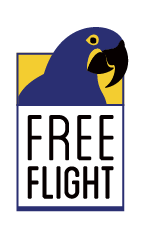About Free Flight’s Service Animal Policy
Service Animal Policy
In order to comply with state and federal laws, Free Flight welcomes any well-behaved service dog in the company of its owner to wait in the front entrance area, but not the exhibit area, of the sanctuary grounds. Service dogs in training and their handlers will have to follow all the guidelines and responsibilities as a full trained service animal.
Service Animals are defined as dogs that are individually trained to do work or perform specific tasks for people with disabilities. Dogs whose sole function is to provide comfort or emotional support do not qualify as service animals under the American Disabilities Act. https://www.ada.gov/regs2010/service_animal_qa.html#def
To determine if an animal is a service animal, the Free Flight staff may ask the following questions:
Is the animal a service animal required because of a disability?
What work or task has the animal been trained to perform?
In accordance with the Americans with Disabilities Act, only trained service animals are permitted on sanctuary grounds. Pets, exotic species, therapy, or emotional-support animals are not permitted.
Service animals must be harnessed, leashed, or tethered, unless these devices interfere with the service animal’s work or the individual’s disability prevents using these devices. In that case, the individual must maintain control of the animal through voice, signal, or other effective controls. The care and supervision of a service animal is the sole responsibility of the owner. https://www.ada.gov/service_animals_2010.htm.
**In the event that a services animal’s presence could theoretically cause collection animals undue stress or anxiety, or present the potential for injury, we reserve the right to designate some areas off limits, or to designate the area as sensitive and request that guests observe extra caution in these areas. Sensitive areas may be designated as a result of new births or hatchlings, nesting or breeding behaviors in progress, or new animals on exhibit. Sanctuary veterinarians, directors and animal care managers will determine whether special circumstances warrant restrictions on service animals in any area. www.ADA.gov/regs
Q26. When might a service dog's presence fundamentally alter the nature of a service or program provided to the public?
In most settings, the presence of a service animal will not result in a fundamental alteration. However, there are some exceptions. For example, at a boarding school, service animals could be restricted from a specific area of a dormitory reserved specifically for students with allergies to dog dander. At a zoo, service animals can be restricted from areas where the animals on display are the natural prey or natural predators of dogs, where the presence of a dog would be disruptive, causing the displayed animals to behave aggressively or become agitated. They cannot be restricted from other areas of the zoo.
https://www.ada.gov/regs2010/service_animal_qa.html
State of California Penal Code 54.7 (a)
Notwithstanding any other provision of law, the provisions of this part shall not be construed to require zoos or wild animal parks to allow guide dogs, signal dogs, or service dogs to accompany individuals with a disability in areas of the zoo or park where zoo or park animals are not separated from members of the public by a physical barrier. As used in this section, “physical barrier” does not include an automobile or other conveyance.
Free Flight will offer care of the service animal while the guest visits the Sanctuary, and if necessary, offer an escort to the owner.
Responsibilities of the visitors with service animals include:
To care for and supervise the service animal, including appropriately disposing of any service animal waste.
To maintain control over the service animal at all times and adhere to leash laws as applicable.
To refrain from taking the service animal into restricted areas.
To remove the service animal when a conflict or potential conflict may occur. This includes free roaming birds and birds in the company of people visiting the sanctuary.
The owner may be held liable for any damage, injury or death caused by the service animal to the grounds, him/herself, the animal or plant collection, employees, or visitors to the same extent as others without service animals are held responsible. Owners should also be aware that the nature of sanctuary activities is such that service animals may be exposed to diseases of animals within the sanctuary’s collection, and this risk is assumed wholly by the owner when bringing the service animal on site.
